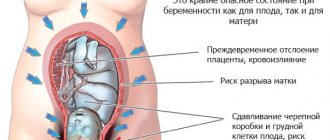Gastritis is a stomach disease characterized by inflammation of the mucous walls of the organ. Pathology can occur in acute and chronic stages. In women who developed gastritis before pregnancy, the risk of developing relapses during pregnancy increases significantly. This is due to a decrease in the protective functions of the body, against the background of which many chronic diseases worsen, an increase in the load on the digestive organs, and hormonal changes. Treatment of gastritis during pregnancy should be carried out under the strict supervision of a doctor, since improperly administered therapy can cause serious complications.
Causes of gastritis in pregnant women
Acute gastritis during pregnancy can take you by surprise. The disease has many reasons to attack precisely during the period of maximum weakness of the body.
Firstly, pregnancy is a constant experience, secondly, hormonal changes and a decrease in the protective function of the stomach, thirdly, pressure on the organs of the constantly growing uterus, plus the activation of the Helicobacter pylori bacterium against the background of a general decrease in immunity. It is this bacterium that provokes acute gastritis or exacerbation of an existing chronic disease.
Experts divide gastritis into atrophic, when the stomach glands atrophy, and infectious, which occurs when the organ is damaged by bacteria.
Photo source: shutterstock.com
Complications and measures to prevent them
Gastritis itself does not pose a threat to the fetus and does not in any way disrupt the course of pregnancy, but it can cause serious inconvenience to a woman, affecting the general condition of the body.
Only in severe cases, when the expectant mother is deprived of the opportunity to eat properly due to pain, does a threat arise to the normal development of the child.
Uncontrolled progression of the disease can lead to a number of complications that manifest themselves during pregnancy or after delivery.
Uncontrolled gastritis during pregnancy leads to the following complications:
- ulcers of the stomach and duodenum;
- polyps (neoplasms on the gastric mucosa that can become injured, causing pain and occasional bleeding);
- tumors.
Benign or malignant neoplasms are considered the most dangerous. All complications of gastritis are directly related to the inflammatory process, which involves the walls of the stomach.
To prevent such consequences, it is necessary to promptly stop inflammation using the principles of rational nutrition and drug therapy.
If this was possible and the patient subsequently adheres to the doctor’s recommendations, complications rarely develop.
Symptoms of gastritis during pregnancy
It is known that expectant mothers often suffer from nausea, constipation and heartburn. Therefore, it is difficult for a pregnant woman to recognize what exactly brings her discomfort: real gastritis or just another stage of expecting a child. After all, the main symptoms of the disease are:
- pain in the upper abdomen near the stomach;
- “rumbling” in the stomach,” gurgling and generally strange sounds inside;
- nausea, possibly vomiting.
- heartburn;
- bloating;
- increased gas formation;
- constipation or diarrhea.
Some of these phenomena accompany even the most “healthy” expectation of a child. You can distinguish ordinary signs of pregnancy from the symptoms of gastritis by listening to your body. For example, nausea will be more pronounced and appear not only in the morning, but also after each meal.
With a real illness, pain in the stomach will disturb you already during and after meals, stools will become frequent and loose, which is usually not observed during the normal course of pregnancy. A woman who has already experienced gastritis once will recognize these sensations and will definitely consult a doctor. But the expectant mother, who does not suspect that she has this disease, quite possibly, will not even tell the therapist about the unpleasant sensations.
Flatulence
Flatulence during pregnancy is a common phenomenon; it is not surprising that this topic does not leave the agenda on online platforms open for virtual meetings of expectant mothers.
Gas formation, of course, is a problem not only for pregnant women, but it is during this period that it has its own special character and other reasons.
One of them is the increased level of progesterone (a hormone responsible for relaxing the muscles of the whole body, including internal organs).
As a result, the muscles in your intestines relax and digestion, including the movement of digested food through the lower part of the tract, slows down. This can now take 30% longer than before. This circumstance contributes to gas formation.
The tendency to flatulence increases in proportion to the increase in the size of the fetus in the womb, as the expanding uterus puts pressure on the walls of the abdominal cavity. This further slows down digestion and activates gas formation.
Since progesterone has a relaxing effect on the muscles of a pregnant woman, it is not easy for her to retain gases. One day you may find yourself in a situation where something similar happened in a public place, and it probably did not cause you great delight, even if you laughed it off and scolded the baby in your stomach.
Therefore, check out the possible solutions to this problem.
Unfortunately, it is impossible to get rid of gases during pregnancy. But to some extent, you can learn to manage this condition. Your main task is to minimize the frequency.
Some foods make you gassy, no matter what you do. The following have been noted to have this effect on the body: legumes, peas, whole grains, broccoli, cabbage and Brussels sprouts, and zucchini.
Flatulence is caused by different foods in different people. You can start keeping a personal diary to track foods that give you gas.
Diagnosis of gastritis during pregnancy
What to do if gastritis worsens during pregnancy? Diagnosing gastritis during pregnancy is difficult due to obvious circumstances, but there are a number of procedures that are still allowed for expectant mothers even in the early stages.
The only 100% case available for determining gastrointestinal diseases is fibrogastroduodenoscopy - examination of organs from the inside using an endoscope (a flexible tube with a camera). Specialists will conduct a study of gastric juice and even take this fluid to measure its acidity.
Doctors can postpone the procedure only if there is a threat of miscarriage or severe toxicosis with a gag reflex. The specialist will also refer the expectant mother for tests to determine the possible presence of that same ill-fated Helicobacter pylori infection and an ultrasound of the abdominal organs.
Photo source: shutterstock.com
Diagnostic methods
In diagnostics, in addition to recording complaints, instrumental research methods and laboratory diagnostics occupy an important place. To examine a woman during pregnancy, preference is given to endoscopy and analysis of gastric juice.
Taking digestive fluid allows you to evaluate its characteristics, establish acidity and select the optimal treatment regimen.
Endoscopy provides information about how badly the gastric mucosa is damaged. This method is rarely used to diagnose gastritis in pregnant women. The main indication for endoscopy is the ineffectiveness of standard therapy.
Treatment of gastritis during pregnancy
A pregnant woman with gastritis will be treated, first of all, with proper nutrition. A diet for gastrointestinal tract diseases involves frequent split meals 5-6 times a day, preparing food in liquid form, and limiting salt intake. Instead of baked goods and fast food, you will have to rely on broths, dairy and fermented milk products, fresh and cooked vegetables, and fruits.
If the patient is recovering, the diet is expanded, allowing the mother to steam or boil fish and meat, pasta, potatoes, ham, cheese and even sausage. But when the exacerbation of gastritis during pregnancy passes, it is better for the pregnant woman not to think about sweet, too salty, canned, pickled, smoked and fatty foods. All this will help you keep your weight under control.
When treating gastritis in pregnant women, doctors often recommend drinking mineral water. For patients with normal or increased acidity of gastric juice - "Borjomi", "Smirnovskaya" or "Slavyanovskaya" - 200-300 milliliters one and a half to two hours after meals three times a day. Women with low acidity of gastric juice are prescribed Essentuki No4 and No17 or Arzni. However, these measures do not replace drug treatment for gastritis during pregnancy.
How to treat gastritis during pregnancy? While waiting for the baby, the Helicobacter infection itself is not eliminated, since the corresponding medications are contraindicated for pregnant women.
When chronic gastritis worsens in pregnant women, doctors resort to Gastrofarm, Maalox and Gepusillac. Concomitant symptoms such as nausea and vomiting are trusted to eliminate Cerucal, and antispasmodics No-Spa and Papaverine Hydrochloride are used to relieve pain.
Fortunately, gastritis does not affect the course of pregnancy, its outcome and the development of the fetus. But this does not mean that treatment can be neglected. If the diagnosis is not addressed in time, the inflammation will spread to other digestive organs, and problems will arise with the intestines and gall bladder. Further gastritis can develop into erosive, gastric ulcer and lead to a precancerous condition.
What helps with nausea
Some foods help relieve unpleasant symptoms:
- crackers, croutons;
- raw vegetables and fruits, especially sour ones;
- lemon (drink lemon juice with water, eat a slice, inhale the aroma);
- tangerine, grapefruit (especially cold ones);
- watermelon;
- ginger (herbal tea, jam and ginger gummies);
- mint (in moderation, in the form of tea or candy; according to many pregnant women, mint is the best medicine for nausea, but for some it has the opposite effect);
- jelly;
- fruit ice, sorbet (don't get carried away!);
- lollipops (especially mint, ginger, lemon).
What else can help?
- B vitamins (especially B6, 50 mg daily);
- acupuncture, if you trust this technique. One of the points is on the wrist, it is called the “P6 Pericardial point”; the effect of special anti-nausea bracelets is based on its stimulation; they are sold in pharmacies; If you are hesitant to massage the indicated area yourself, use this simple device.
Neither nausea nor vomiting is dangerous to the health of the mother and the unborn child. If there are no more than five episodes of vomiting per day, this is considered a mild degree of toxicosis and does not require serious correction, other than following the rules indicated above.
During pregnancy, tests are regularly taken, and from them the doctor can judge how well the condition of a pregnant woman experiencing bouts of vomiting corresponds to the average values. If hemoglobin and leukocytes in the blood test are normal, acetone and ketone bodies are absent in the urine, and bilirubin in the biochemical blood test remains within acceptable values, toxicosis can be corrected by normalizing diet and lifestyle.
Moderate toxicosis is said to occur in cases where up to 10 bouts of vomiting are observed, and the doctor prescribes medications. In addition to medications that relieve the symptoms of toxicosis, drugs from the antacid group that relieve heartburn may be prescribed.
Prevention of gastritis during pregnancy
The disease brings discomfort and anxiety to the expectant mother, therefore, in order to avoid them, it is worth thinking about prevention at the stage of pregnancy planning. Moreover, the measures are very simple:
- moderate split meals in small portions 4-5 times a day;
- exclusion of foods that irritate the gastric mucosa: smoked and canned foods, seasonings, strong tea and coffee, soda;
- giving up bad habits, limiting alcohol consumption;
- if chronic gastritis has already been diagnosed, consult a gastroenterologist, discuss with him the risks of exacerbation of the disease and the tactics of its treatment.
Constant malaise, problems with stool and stomach pain should not become an obstacle to fully enjoying this magical period in life - pregnancy.
Doctors recommend that women carefully prepare for planning a child, checking all the components of their body. The digestive system should be high on this list. After all, only a healthy woman is able to give birth and raise an absolutely healthy and strong baby.
Features of gastritis
Gastritis can be either acute or chronic.
Gastritis can manifest itself in 2 types: acute and chronic. The acute form is characterized by a sharp onset, a bright course, accompanied by all the symptoms characteristic of this disease.
The chronic form can develop if it is not possible to completely stop the disease during its acute manifestation.
A diagnosis of “chronic gastritis” threatens the possibility of experiencing exacerbations throughout your life.
The chronic form cannot be cured. Therefore, a person with such a diagnosis will have to change their lifestyle and eating style in order not to encounter relapses.
The acute form is characterized by a strong inflammatory process that affects the mucous membrane of the stomach and duodenum. It can begin as a result of one of the following reasons or a combination of them:
- chemical exposure;
- bacterial;
- mechanical;
- thermal.
Negative factors have a destructive effect on the mucous membrane, then an inflammatory process begins to occur in the affected areas. At the initial stage, the superficial layers are affected; over time, inflammation penetrates into the deep structures. It can even affect the muscle layer of the gastric wall.
How to treat
Treatment of gastritis is a long process that requires compliance with all specialist recommendations. To prevent exacerbation of gastritis, you should minimize stressful situations, and also pay attention to your diet and diet, excluding harmful foods from it. Before therapy, you must undergo all examinations that will help identify the exact form of the disease in order to prescribe the appropriate treatment.
Endoscopy during pregnancy is prescribed extremely rarely, since swallowing a probe causes discomfort that can negatively affect the well-being of the expectant mother.
Physiotherapeutic methods
In certain cases, physiotherapy will help cope with the ailment. Some pregnant women are sure that acupuncture is the most effective method, but this method cannot be considered the safest during pregnancy.
The same can be said about electrophoresis, which transports the prescribed drug directly to the area of the disorder. During pregnancy, this technique is used with caution, since there are no large-scale studies on how it affects the baby in the womb. It is not recommended to use electrophoresis in late toxicosis, which is accompanied by severe vomiting and in chronic renal pathologies.
Magnetic therapy is the safest, but it also has its contraindications, which a specialist will familiarize you with.
Medicines
Most of the medications that effectively treat gastritis are contraindicated for expectant mothers. That is why it is necessary to normalize nutrition in order to cope with the disease.
During pregnancy, antibacterial medications that neutralize the effect of the bacterium Helicobacter pylori are prohibited due to their negative effect on the fetus. Antisecretory drugs are also prohibited.
But the following medications can be used for treatment:
- Dimethicone - has a restorative effect.
- Raglan, Cerucal - cope with heartburn and nausea.
- Probiotics (Bifidum, Narine, Bifiform).
- Antispasmodics - eliminate spasms and pain.
- Preparations with pancreatic and gastric enzymes are recommended for use in cases of reduced secretory activity.
You should refrain from taking Almagel, Gastal, Maalox and Phosphalugel, as they contain aluminum, which is not recommended for use during pregnancy.
Mineral water
Sometimes mineral water will help cope with gastritis. But you can use it only after your doctor’s permission.
If a pregnant woman has low acidity, then you can drink “Essentuki” number 4 and 17, “Mirgorodskaya”. With high acidity, “Borjomi” and “Jermuk” are allowed.
Drink medicinal mineral water 2 hours after eating.
The most effective treatment for gastritis is diet therapy
Gymnastics for pregnant women
Here are exercises that have proven effective in normalizing the functioning of the gastrointestinal tract.
- Cat pose. This is one of the best asanas in yoga; it increases the flexibility of the spine and relieves muscle tension that affects the functioning of internal organs. The pose is so good that even ardent opponents of yoga have included it in the list of recommended exercises for pregnant women.
Technique: position on all fours, knees exactly under the pelvic bones, hands under the shoulders, legs and arms are in the same line. We alternately bend and bend in the lumbar and thoracic spine. When the back is rounded, the head is tilted down, the eyes look at the floor. When a bend is made, the head rises and the gaze is directed upward. Inhalation is done in the position of an arched back, exhalation - in a concave position.
- Kegel exercises.
- Gentle exercises for pregnant women to warm up all the muscles of the body. Exercises in a squatting position, stretching, gentle turns, and gentle twists are especially useful. Exercises that affect the muscles of the neck, back and especially the pelvis directly affect the functioning of internal organs, including the digestive system.
In addition to physical exercise, the following have a good tonic effect on the body and a relaxing effect on the muscles:
- aerobics;
- callanetics;
- dancing;
- swimming (water aerobics for pregnant women);
- walking is the simplest and most accessible type of physical activity for every pregnant woman; Walking at an intense pace in the fresh air is especially good;
- jogging (for those who were actively jogging before pregnancy);
- yoga - when performing some poses, not only positive changes in physical fitness were noticed, but also improved mood, better sleep and increased overall endurance (including psychological), which is very important for a pregnant woman.
Remember that before you start engaging in any physical activity, you need to consult a doctor, and it is better to familiarize yourself with the technique of performing specific exercises in special classes for pregnant women.
Whatever type of physical activity you choose for yourself, remember about moderation (30 minutes a day is the optimal level of exercise for non-athletes), listen to the signals that your body sends you, and avoid physical fatigue, dizziness, and irregular heartbeat and breathing. Physical exercise should bring not only health to the body, but also joy to the spirit - only in this case will the expected positive effect be felt.
What prevents pregnancy from occurring?
It is worth remembering that, despite the high level of development of medicine, there are idiopathic (unexplained) causes of infertility
Hormonal disbalance
This is one of the most common reasons that prevent conception. Hormonal balance is a very vulnerable system in a woman’s body. It can be influenced by stress, depression, environment, physical activity, nutrition, heredity, routine, sleep quality and many other factors.
Most often, its main symptom is menstrual irregularity. Of course, almost all women have encountered “delays”. But it’s one thing to have a one-time incident, lasting up to 5-7 days, due to strong emotions, colds, climate change. Another is constant fluctuations for more than a week.
With an irregular menstrual cycle, pregnancy may not occur for a long time. It definitely needs to be restored!
This is often difficult to do without a specialist, because in order to identify the true cause of failures it is necessary to undergo a series of tests.
Most diseases of the reproductive organs in women are hormone-dependent. The most common: ovarian cyst, polycystic ovary syndrome, uterine fibroids, hypothyroidism, hyperprolactinemia, fibroids. To prevent dishormonal problems, you need to visit a gynecologist once a year, or after changing your sexual partner.
If there is a failure for more than 7 days, three cycles in a row, immediately contact a gynecologist-endocrinologist.
If you have a hormonal imbalance, you may need to consult a female psychologist, because hormonal changes manifest themselves not only in cycle disorders. Skin acne, male pattern hair growth, and fullness may occur. All this often causes stress or depression and aggravates the situation. If you are faced with something like this, it is dangerous to remain alone with this problem. The support of loved ones may be enough. And if it is not there at all, or it passes by your heart, take care of yourself - talk to a psychologist.
CHECK LIST - EXERCISES FOR PREGNANT WOMEN
RULES AND TRAININGS FOR EACH TRIMESTER
I want a checklist
Exercising allows the body to better adapt to the increasing load associated with fetal growth, changes in the body, and a shift in the center of gravity.
Inflammatory processes of the reproductive organs.
The cause of inflammation can be a violation of the vaginal microflora and infections acquired during sexual activity. For example, a woman is sick with herpes, or papillomavirus. This can lead to problems conceiving.
If a woman does become pregnant, then treating these diseases becomes more difficult. The number of drugs is limited, their effect is no more than 20%.
The infection can rise up to the membrane of the fetus and cause inflammation - amnionitis.
In this case, there is a high chance that the child will experience oxygen starvation, which has a bad effect on brain development. In addition, due to a viral infection, children may develop problems with the genitals, hearing, and vision. Therefore, be sure to get tested and completely cure these viral diseases, if you have them, before pregnancy!
Online consultation with gynecologist Larisa Nikolaevna Dmitrieva
consultation cost: 500 rubles
Online consultation
During the consultation, you will be able to voice your problem, the doctor will clarify the situation, interpret the tests, answer your questions and give the necessary recommendations.
Inflammatory processes can also be chronic. In the case when a woman’s inflammation of the uterine appendages has developed into a chronic form (with exacerbations 3-4 times a year), this can lead to problems with conception and even infertility. If she is completely cured, but pregnancy does not occur within a year, then doctors begin to suspect infertility.
Poor nutrition.
The problem of excess weight is very acute in the modern world. In our case, we couldn’t do without it either. When planning a pregnancy, it is necessary to reduce your weight to normal values.
Excess weight is a threat of complications during pregnancy.
One of the reasons for excess weight may be diseases of the endocrine system.
On the other hand, lack of weight can also prevent pregnancy. But if you “fall short” of the norm just a little, you are comfortable in this state and you do not have problems with the menstrual cycle, then you should not significantly change your diet. Try increasing your carbohydrate intake a little.
CHECK LIST - DOWER FOR THE FUTURE MOTHER AND BABY
We will send a checklist in PDF format to your email.
I want a checklist
It is better to start preparing your dowry in advance, or at least make a thoughtful list of everything you need. You can use the checklist that we will send you by email.
Other reasons
Pregnancy may be hampered by prolonged exposure to chemotherapy or cancer. As well as congenital pathologies that manifest themselves in adolescence. In these cases, doctors immediately warn about possible problems with conception.
Indirectly, pregnancy can be prevented by diseases of the internal organs. It is very difficult to treat them during pregnancy.
If you have diseases related to internal organs, consult a therapist or immediately get examined by a specialist doctor.
In addition, pregnancy may not occur due to the use of certain medications: antibiotics, antidepressants, strong painkillers. An excess of vitamin C in a woman’s body leads to a significant decrease in the amount of cervical fluid, as a result of which sperm have a reduced chance of surviving in the female body.
Impact of contraceptives
Many people think that the use of oral contraceptives may further prevent pregnancy. This is wrong. If a woman took the right medications, her reproductive function will not be affected.
In a healthy woman, pregnancy should occur 3-6 months after she stops taking contraceptives.
Modern drugs do not have a negative effect on the unborn child, this is confirmed by numerous studies. Contraceptives only affect the woman's body. Mostly, women under 35 years of age are prescribed fifth-generation drugs based on the hormones estrogen and progesterone. All healthy women to whom we prescribed them became pregnant within 3 months.
Mostly, women under 35 years of age are prescribed fifth-generation drugs based on the hormones estrogen and progesterone. All healthy women to whom we prescribed them became pregnant within 3 months.
How to get tested before pregnancy
To identify diseases that can interfere with conception or worsen during pregnancy, doctors have developed a unified set of examinations.
This diagnostic complex is included in preconception preparation, the purpose of which is to eliminate causes that can negatively affect pregnancy, the perinatal period and the ability to conceive. Doctors examine the reproductive organs, take tests for infections and hormonal balance, and determine the woman’s general condition. If a disease is detected, it is eliminated, and only after making sure that the woman is healthy is she given the go-ahead for pregnancy. A similar set of examinations exists for men.
Diet
If gastritis worsens in the early stages of pregnancy, especially if the pregnant woman suffers from toxicosis at this time, experts recommend adhering to a certain diet. If there is a general deterioration in health or weakness, bed rest and maximum rest are recommended.
Rules
Basic rules of diet therapy for gastritis in pregnant women:
- Fractional meals, consisting of 6-8 meals per day.
- Rough food is prohibited; food must have the consistency of porridge and puree or be semi-liquid.
- You should not eat smoked, fried, sour or spicy foods, as they increase the production of gastric juice.
- It is recommended to reduce the amount of salt consumed.
- Remove pickled foods and pickles from your diet.
- Food should be varied and nutritious; the daily diet should contain sufficient amounts of fats, vitamins, minerals and carbohydrates.
- If possible, completely avoid eating foods that contain fast carbohydrates.
- It is forbidden to eat too hot or cold food; food should be warm.
- To enrich the body with useful microelements, it is recommended to take multivitamins for expectant mothers.
Grocery list
Authorized products:
- steamed cutlets;
- vegetables;
- scrambled eggs;
- greenery;
- boiled river fish;
- boiled poultry meat;
- fresh fruits;
- dried white bread;
- milk;
- steamed vegetable stew;
- milk soups;
- meatballs;
- semi-liquid porridge.
Now let's take a closer look at the power supply diagram. In the first days, it is recommended to eat semi-liquid food that does not irritate the gastric mucosa. These are the products:
- milk;
- cottage cheese;
- vegetable puree soups;
- porridges and soups with milk.
After a few days, you can add hard-boiled eggs, vegetable side dishes, fresh fruits and vegetables to your diet.
As her health improves, the pregnant woman can gradually return to her usual healthy diet, excluding from the diet:
- coffee;
- pickles;
- broths cooked with fish or meat;
- peas, beans;
- cabbage, onions, radishes;
- sweet and flour products;
- smoked meats;
- seasonings, spices, herbs;
- fried foods.
What to do to prevent the disease
Effective prevention lies in proper nutrition. Food should be consumed in small portions, about five times a day. It is recommended to chew long and thoroughly before swallowing food. Overeating has a negative impact on patients diagnosed with gastritis. Frequent consumption of food irritates the mucous membrane and stretches the stomach.
It is important that women exclude strong broths, seasonings, smoked foods, and preserves from their diet. During an exacerbation and after a relapse, avoid strong tea, coffee, and carbonated water.
You should always remember that systematic stress and alcohol abuse provoke the onset of the disease and have a negative effect on the fetus.










